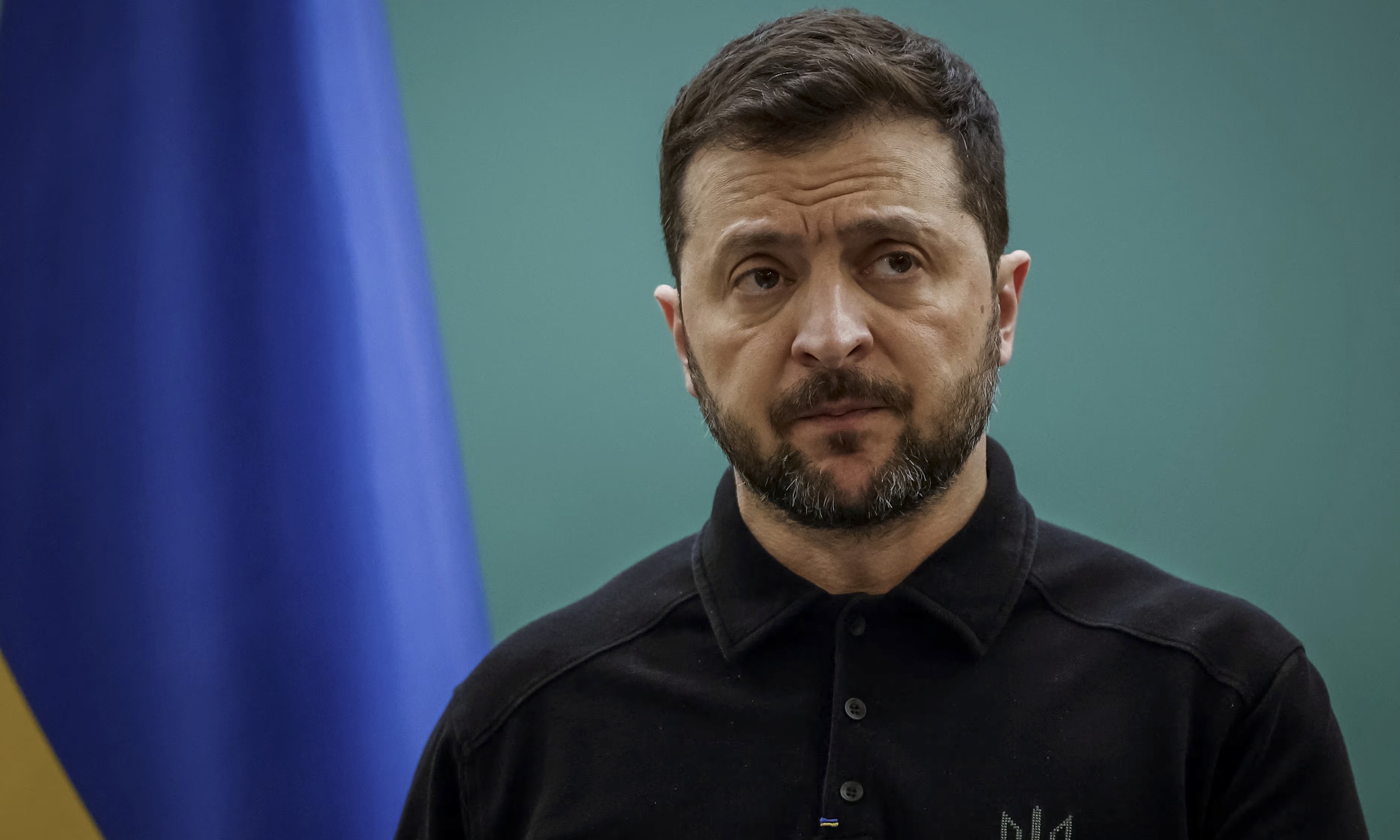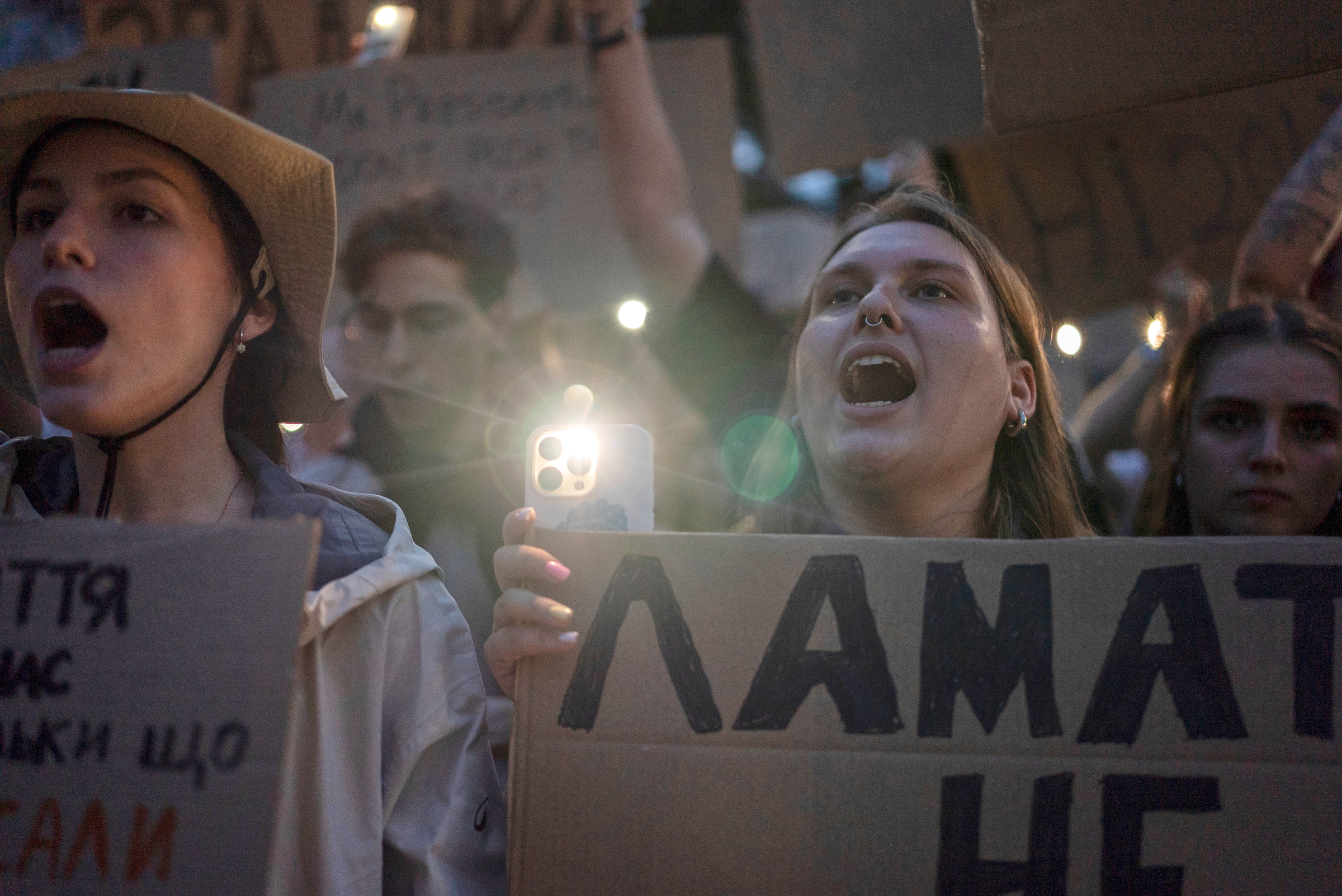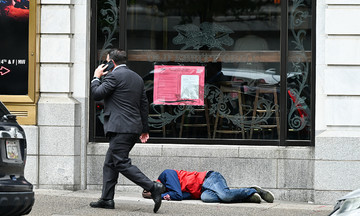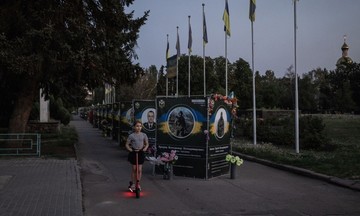Hundreds protested in central Kyiv on 22/7 after President Volodymyr Zelensky signed a law diminishing the autonomy of the National Anti-Corruption Bureau of Ukraine (NABU) and the Specialized Anti-Corruption Prosecutor's Office (SAPO). Chants of "Veto the law" echoed through the streets, a rare public display of dissent since the conflict with Russia began in 2022. This demonstration underscores public discontent with the government's tightening grip on anti-corruption efforts.
The new law places NABU and SAPO, two leading independent anti-corruption bodies, under the control of the Prosecutor General, a presidential appointee. Online, critics decried the move as "irreversible," the "peak of corruption," and warned of a "dark period ahead" for Ukraine. They argue it dismantles a decade of hard-won reforms and risks a resurgence of widespread corruption.
 |
Ukrainian President Volodymyr Zelensky at a mosque in Kyiv in March. Photo: Reuters |
Ukrainian President Volodymyr Zelensky at a mosque in Kyiv in March. Photo: Reuters
Following the EuroMaidan protests that ousted President Viktor Yanukovych in 2013-2014, Ukraine ramped up anti-corruption reforms as part of its efforts toward European integration and to meet requirements from the International Monetary Fund (IMF) and the European Union (EU).
NABU, established in 2014 to replace the ineffective National Anti-Corruption Committee, has a staff of approximately 700, including investigators trained by the FBI and the EU. The bureau plays a crucial role in Ukraine's legal and political reforms. While responsible for investigating high-level corruption cases, NABU lacks prosecutorial powers. Instead, it submits cases to SAPO. This setup was designed to ensure checks and balances between the two independent bodies and shield them from political influence.
The new law's passage came just a day after the EU and G7 voiced concerns over the Security Service of Ukraine (SBU) conducting over 70 raids on locations linked to NABU, a move activists criticized as undermining anti-corruption efforts. The law grants the Prosecutor General access to and control over case files, the ability to issue binding instructions to NABU investigators, and the power to unilaterally close cases, among other authorities.
Experts worry the law could jeopardize Ukraine's relationship with the West and crucial financial aid. "Everything is now reversed," Svitlana Matviienko, executive director of the non-profit Ukrainian Initiative for Legislative Studies, stated after the law's passage. "Today, the country has lost not only its anti-corruption institutions but also the trust that has been so hard to build since 2014." Matviienko warned that the new law's provisions are reminiscent of the Prosecutor General's powers under Yanukovych, who could single-handedly decide the outcome of any case, eroding public trust in the justice system.
Ukrainian historian Yaroslav Hrytsak commented, "This decision could be considered a coup. Not in terms of changing power, but in how power operates. A healthy state values the independence of its institutions." He noted the timing of the law, coinciding with a sensitive period in the conflict with Russia when Ukraine relies heavily on Western financial and military support. "It's dangerous, disappointing, and suicidal," he added.
Matviienko agreed that the new law risks slowing down EU accession talks and jeopardizing vital financial aid. "It marks an irreversible turning point," she said. The EU called the law a "serious setback." EU Enlargement Commissioner Marta Kos emphasized that anti-corruption institutions are "essential for Ukraine's path to EU membership."
Volodymyr Ariev, a member of parliament from the opposition European Solidarity party, warned the new regulations threaten Ukraine's progress toward Europe. He stated that the independence of NABU and SAPO, key to "EU membership, has been broken."
Petro, a sergeant in the 38th Marine Brigade serving near Pokrovsk in eastern Ukraine, expressed concern that the move could cost Ukraine vital support from the US and Europe, which have criticized corruption in Ukraine. "This action will only allow some to siphon aid funds without punishment. No one supports such a country," he said.
Anastasia Radina, chair of the parliamentary anti-corruption committee and a member of Zelensky's party, commented, "NABU and SAPO are not just acronyms or law enforcement agencies. They were established as new, independent bodies, untainted by past corruption."
Sergey Fursa, an expert at Dragon Capital, Ukraine's leading investment bank, believes Kyiv should brace for negative consequences. "The Ukrainian government has crossed all red lines, violating all obligations under IMF cooperation, EU integration, and even the most outlandish conditions," he stated. "After this, anything is possible. It has created huge risks for the country."
Investigative journalist Yuriy Nikolov noted that NABU has targeted high-ranking officials, those with the greatest opportunity for corruption, with some success. In 2023 alone, the bureau investigated corruption involving 21 high-ranking officials, 39 heads of state-owned enterprises, 16 judges, and 11 members of parliament. If NABU is neutralized, anti-corruption efforts might continue, but only at lower levels. "High-level corrupt individuals will have a chance to escape justice," he said. "The law will be applied selectively."
 |
Protesters demonstrate against a law targeting anti-corruption institutions in central Kyiv, Ukraine, on 22/7. Photo: AP |
Protesters demonstrate against a law targeting anti-corruption institutions in central Kyiv, Ukraine, on 22/7. Photo: AP
Activist Ihor Lachenkov commented, "Parliament passed a law significantly weakening NABU and SAPO. This is completely unacceptable in our time. We are heading towards the EU, and Ukraine has been building these agencies for years. But when they target those close to the President, they are immediately attacked."
President Zelensky has not addressed these accusations. He signed the law immediately after its parliamentary passage, before the Ukrainian public and Kyiv's allies could fully grasp its implications.
Following a meeting with top law enforcement and anti-corruption officials on 23/7, Zelensky stated, "We all have one common enemy: Russia. Protecting the Ukrainian state requires a strong executive system that ensures true justice."
Vu Hoang (AFP, Kyiv Independent, AtlanticCouncil)












